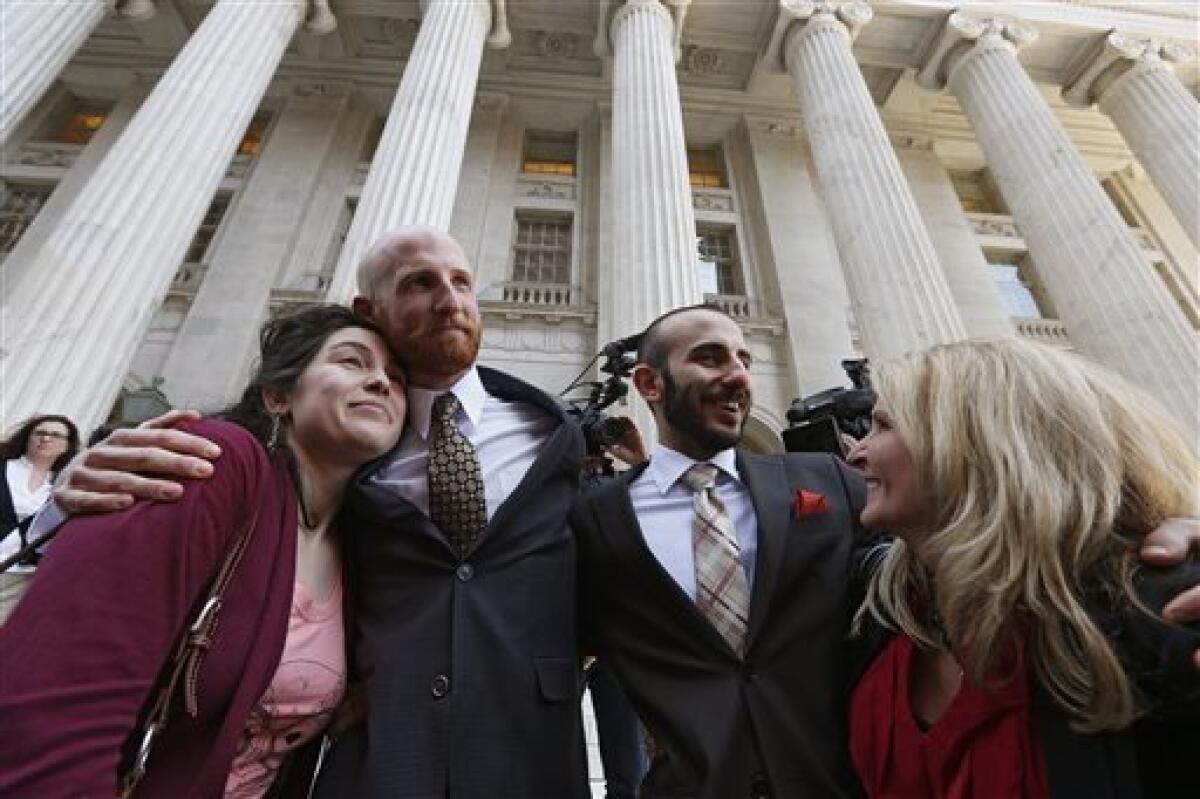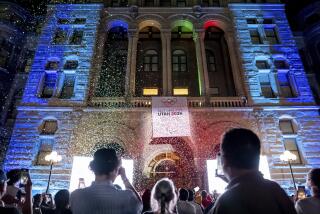Utah gay marriage case argued before federal appeals court

DENVER — After the courtroom arguments ended, the hundreds of pages of previously filed legal briefs had been read, and the nervous tears of the three couples at the heart of a Utah same-sex marriage case had dried, it came down to one question:
Who gets to define matrimony?
On Thursday, a three-judge panel of the U.S. 10th Circuit Court of Appeals in Denver pondered that question in a closely watched case that weighs a state’s right to enforce its own laws against the rights of individuals to marry regardless of gender.
Kitchen vs. Herbert, which challenges Utah’s same-sex marriage ban, came amid a rush of similar lawsuits across the country. Utah’s appeal is the first to reach the federal appellate level since last summer, when the U.S. Supreme Court struck down provisions of the Defense of Marriage Act that denied federal benefits to same-sex couples.
Arguing on behalf of the deeply conservative state, Utah Special Assistant Atty. Gen. Gene Schaerr contended that his state has the constitutionally guaranteed right to make and enforce its own laws. The people of Utah spoke in 2004, he said, when they amended the state constitution to define marriage as exclusively between one man and one woman.
“That is the traditional vision of marriage and that is Utah’s vision of marriage,” Schaerr told the appellate court.
Salt Lake City lawyer Peggy Tomsic, who represents the three couples who challenged Utah’s ban, countered with equal vehemence. “Every state, Utah included, is bound by the 14th Amendment,” she told the court, contending that Utah’s same-sex marriage ban unlawfully discriminates against a group of people. She added that same-sex couples in Utah must live with the “stigma and harm of being treated like second-class citizens.”
Her clients, Derek Kitchen and Moudi Sbeity; Laurie Wood and Kody Patridge; and Karen Archer and Kate Call, sat silently in the front row. Kitchen and Sbeity often had an arm looped over the other’s shoulder. Kitchen sued after being denied a marriage license by a county clerk last year.
In December, U.S. District Judge Robert Shelby struck down Utah’s ban as violating same-sex couples’ constitutional guarantee of equal protection of the law and due process. He refused to suspend his ruling pending appeal, and scores of couples wed before the U.S. Supreme Court put the ruling on hold. The status of more than 1,200 same-sex marriages is in limbo.
Many believe the case, or a similar one, is destined for the U.S. Supreme Court. The same panel of appellate judges will hear an Oklahoma case next week.
Although it is impossible to predict how the judges will rule, some apparent clues emerged during the oral arguments before what appears to be a split panel.
Judge Jerome Holmes, a Republican nominee and the first African American on the 10th Circuit, compared banning same-sex marriage with a previous Virginia ban on interracial marriage. “Why is that any different from here?” he asked.
Schaerr responded that the Virginia case was not applicable because it dealt with white supremacy.
Holmes also appeared skeptical of Schaerr’s argument that sociological studies have found that children do better with parents in heterosexual marriages and that same-sex parenting renders one gender or the other unnecessary.
He asked pointedly how children of same-sex couples who were legally married in other states would be treated in Utah.
“The state does not allow them to be recognized,” Schaerr said. When he tried to equate same-sex couples raising children with polygamous families, the judges cut him off.
Judge Paul Kelly, also a Republican appointee, seemed more sympathetic to Utah’s position. He challenged Tomsic repeatedly about usurping the voting public’s will simply because her clients disagree. He added that same-sex marriage was too new to fully understand its impact on children.
Judge Carlos Lucero, a Democratic appointee, also wondered aloud how children of legally married same-sex couples would be treated in Utah. He compared the situation to the 1857¿ Dred Scott decision, in which the U.S. Supreme Court ruled that African Americans were not citizens and could not sue for their own freedom.
Lucero also asked how banning a gay couple from marrying would promote heterosexual marriage.
After the hearing, the couples and their attorneys, friends and family posed for pictures and spoke to reporters with cautious optimism.
“I look forward to the day we can move from state to state,” said Utah native Karen Archer, who married Kate Call in Iowa, where same-sex marriage is legal thanks to the Iowa Supreme Court.
Kitchen said it has been difficult to listen as his life is publicly dissected and argued.
In a surprise move, Sean Reyes, the newly appointed Utah attorney general, approached Kitchen and the other plaintiffs and offered his sympathy that they had gone through so much pain. “It’s not personal,” he told them.
Later, Reyes carefully dodged reporters’ questions about his own views on Utah’s law, calling them irrelevant. He said of the couples: “I wish them the best. Their families are as important to them as mine is to me.”
nation@latimes.com
More to Read
Sign up for Essential California
The most important California stories and recommendations in your inbox every morning.
You may occasionally receive promotional content from the Los Angeles Times.










